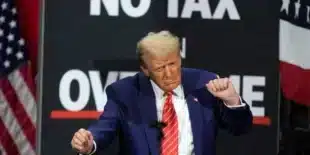The United States and Europe are moving quickly to reduce China’s dominant position in clean energy technologies by increasing subsidies for local manufacturers and raising tariffs on Chinese imports, marking a significant shift toward protectionism.
China’s stronghold on clean energy supply chains presents a dilemma for governments striving to green their economies and meet urgent climate goals while also safeguarding domestic industries and jobs from an influx of inexpensive imports. Without China’s electric vehicles (EVs), solar panels, wind turbines, and batteries, achieving reductions in global warming emissions could take longer and become more expensive for businesses and consumers.
However, Western nations are wary of repeating Europe’s mistake of becoming overly reliant on a single supplier, as happened with Russia for cheap gas. They also aim to reap the economic benefits of developing their own future technologies.
Margrethe Vestager, the European Union’s competition chief, highlighted China’s strategy to dominate the solar panel industry by heavily subsidizing domestic suppliers and limiting market access for foreign businesses. This approach has led to a situation where less than 3% of the solar panels installed in the EU are produced locally. Vestager emphasized the need to prevent a similar situation in other sectors like electric vehicles, wind energy, and essential chips.
The intensifying global competition in green technologies is heightening tensions between China, the world’s leading manufacturer, and its major trading partners. Both the U.S. and the EU have taken a tough stance on Chinese imports, with Washington imposing higher tariffs not only on Chinese EVs but also on batteries, solar panels, and critical minerals.
Fatih Birol, CEO of the International Energy Agency (IEA), noted that the competition in the clean energy sector is fierce, driven by not only climate concerns but also industrial policy, as nations vie for a leading position in the next phase of industrial technology.
China currently leads in this race, accounting for 75% of global investment in clean technology manufacturing last year, though this is down from 85% in 2022, according to the IEA. This year, China is expected to invest $676 billion in clean energy, more than double the U.S.’s projected $315 billion and far ahead of the EU’s $370 billion. These substantial investments have made China the world’s largest and lowest-cost supplier of many technologies and critical minerals essential for the clean energy transition.
Chinese manufacturers produced over half of all electric vehicles sold globally last year. Additionally, most of the global manufacturing capacity for EV and industrial-use batteries, wind turbines, and solar panels is concentrated in China. The country also dominates in processing critical minerals like lithium, cobalt, and graphite, which are crucial for EVs and other green technologies.
China’s near-monopoly on the processing of certain critical minerals poses significant risks for the global transition to green energy. In response to export restrictions imposed by the U.S., the Netherlands, and Japan on semiconductor equipment, China last year imposed export controls on gallium and germanium, rare earths vital for semiconductor manufacturing. China later tightened its control over the supply of graphite used in EVs.
The world’s second-largest economy has openly expressed its desire to export more of its “new trio” of products—EVs, lithium batteries, and solar panels. However, in June, the EU imposed substantial tariff increases on Chinese EVs, stating that the EU’s green transition should not rely on unfairly subsidized imports that harm European industry.
While tariffs may protect local manufacturers, experts warn they could hinder the shift to green energy and increase costs for businesses. Academics David G. Victor and Michael R. Davidson argue that broad tariffs, like those implemented by Washington, raise the cost of Chinese imports, making it more difficult for those seeking to use solar panels or batteries to reduce emissions.
Victor, a professor at the University of California San Diego, cautioned that attempting to transition to green energy without China would slow down the energy transition, which would be detrimental to the environment. Similarly, International Monetary Fund chief economist Pierre-Olivier Gourinchas recently warned that the surge in tariffs and protectionist measures could complicate global efforts to address challenges like climate change.


